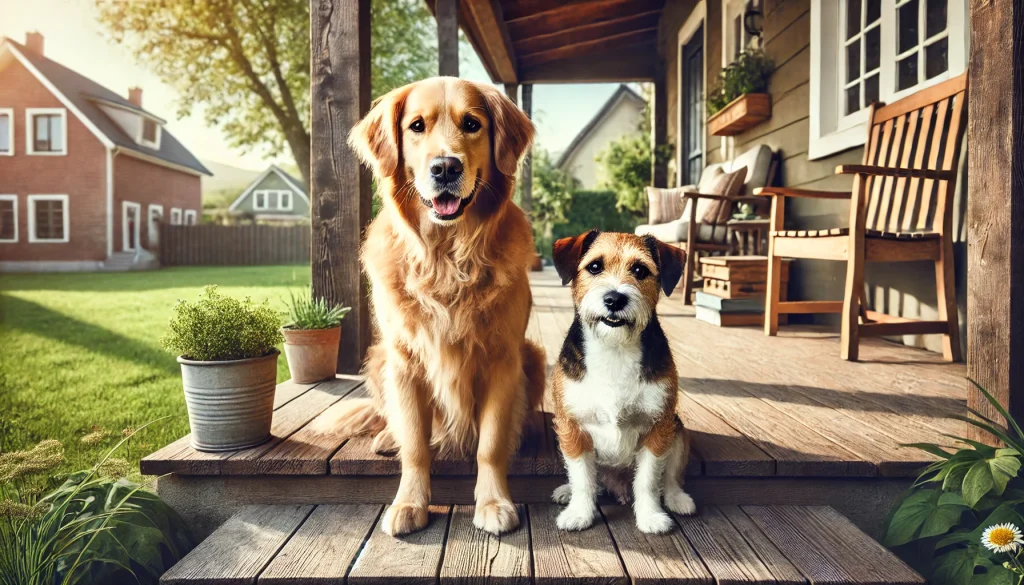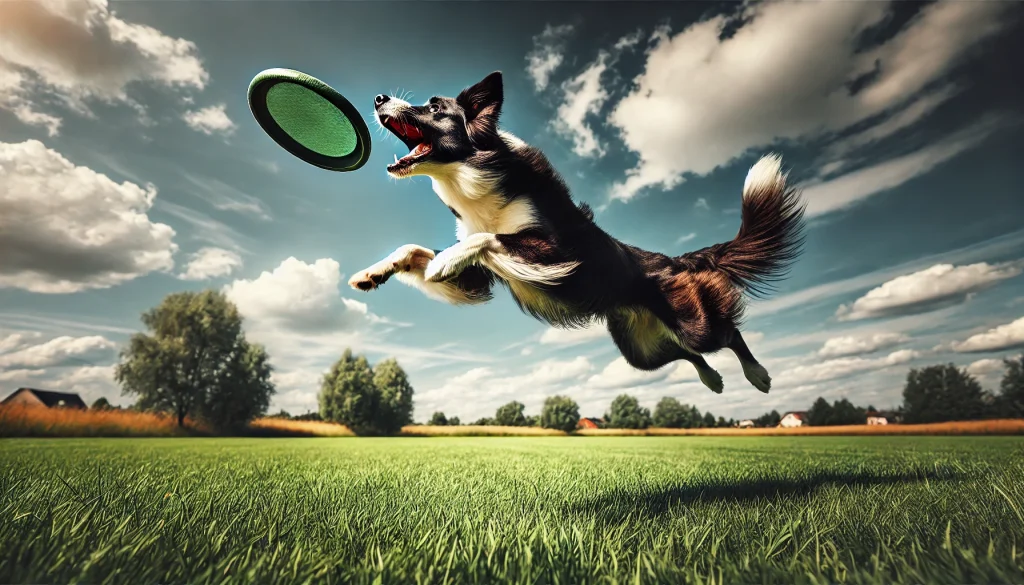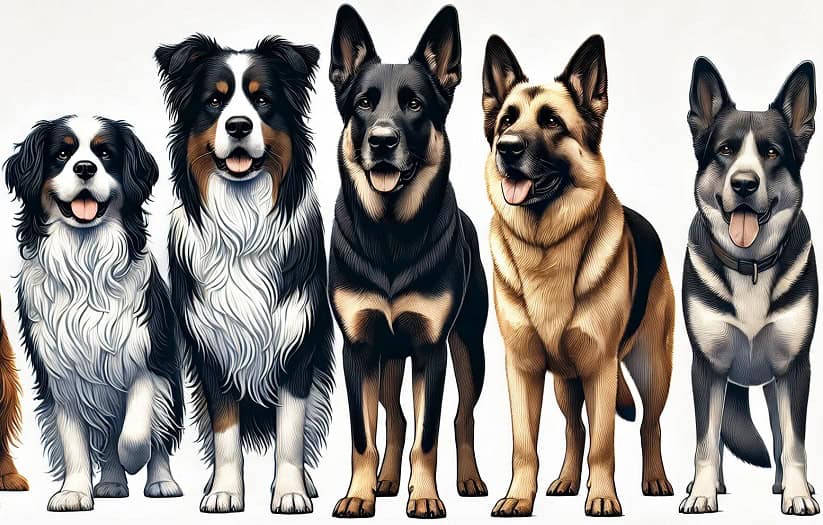Like most dog owners, I consider mine to be a part of the family. My dog’s pronouns are “she/her,” I call her Petunia, and she has her own high-quality bed with her own pillow and blanket. (Although, in reality, she favors my bed. In the center. Preferably while I’m in it.)
With a dog’s frequently elevated status, almost to the level of a person, it begs the question of whether dog breeds are capitalized. Here’s a deep dive into the seemingly simple capitalization rules that, nevertheless, wind up being slightly more confusing than you might think.
(If you make a purchase using the links in this post, we may earn a commission.)

Are Dog Breeds Capitalized in Everyday Usage?
Do dog breeds need to be capitalized? Of course, the answer is “it depends.” The first question we need to answer is what type of words the dog breeds are so that we know if the dictionary capitalizes them automatically.
Is the Breed of a Dog a Proper Noun?
Most professional writing styles don’t consider dog breeds to be proper nouns. First, let’s take a look at the particulars of proper nouns:
- A type of noun that identifies a specific person, place, or thing by a nongeneric name.
- Proper nouns, also called proper names, are always capitalized in English.
For example, “beagle” refers to a certain type of dog, like “redhead” refers to a certain type of person. “Beagle” is generic, meaning that it relates to a large class of dogs.
There are dozens of generic breeds, but here are just a few:
- terriers
- hounds
- huskies
- retrievers
None of these names should be capitalized, because they don’t qualify as proper nouns.
However, professional organizations, such as the American Kennel Club, consider all dog breeds to be proper nouns and capitalize all of the words in the name. The AKC even goes so far as to capitalize the “Dog” in “American Eskimo Dog!”

How Do You Capitalize Dog Breeds in AP Style?
According to the AP Stylebook, “Follow the spelling and capitalization in Merriam-Webster. For breeds not listed in the dictionary, capitalize words derived from proper nouns.”
BUY – The Associated Press Stylebook: 2024-2026
Dog Breeds Named After Locations
For instance, many dog breeds are categorized by names that contain a geographical location, such as:
- American Pit Bull terrier
- Australian shepherd
- Belgian Malinois
- Boston terrier
- Cavalier King Charles spaniel
- Chesapeake Bay retriever
- Chihuahua
- English bulldog
- French bulldog
- German shepherd
- Irish setter
- Shiba Inu
- Korean Jindo
- Maltese
- Norwegian elkhound
- Pembroke Welsh corgi
- Portuguese water dog
- Rhodesian ridgeback
- Scottish terrier
- Shetland sheepdog
- Siberian husky
- Spanish water dog
- Tibetan mastiff
- Welsh terrier
- Yorkshire terrier
There is a notable exception: The AP does not capitalize “dalmatian,” even though that breed is named after the Dalmatia region of Croatia.
Dog Breeds Named After People
Breeds are also frequently named after a person or a recognized group of people:
- Bedlington terrier – Named after the town of Bedlington
- Boykin spaniel – Named after Whit Boykin
- Dandie Dinmont terrier – Named after a fictional character, Dandie Dinmont
- Doberman pinscher – Named after Friedrich Louis Dobermann
- Gordon setter – Named after Alexander Gordon, Duke of Gordon
- Jack Russell terrier – Named after Reverend John Russell
- Plott hound – Named after Johannes Plott
- Saint Bernard – Named after Saint Bernard of Menthon
- Samoyed – Named after the Samoyedic people
- Sealyham terrier – Named after Sealyham, the estate of Captain John Edwardes
Commonly Mis-Capitalized Dog Breeds
There are numerous dog breeds that you’ll often see capitalized, even though they shouldn’t be. (Well, at least according to AP style’s capitalization rules.) Most frequently, the breed names that originate from a phrase in a different language. Here are a few examples:
- dachshund – German for “badger dog”
- papillon – French for “butterfly”
- shih tzu – Mandarin for “little lion” or “little dog”
This is why looking up the breed in Merriam-Webster is a great recommendation because the rules vary for so many different reasons.
As a side note, I’ve always wondered where so many dog breeds get their names. It turns out many of them are just named after the dog’s identifying features or how they act.
- affenpinscher – German for “monkey terrier”
- basenji – Lingala for “village dog”
- beagle – From Old French “beegueule,” meaning “loudmouth”
- bichon frisé – French for “curly lap dog”
- borzoi – Russian for “swift”
- lhasa apso – Tibetan for “long-haired Tibetan dog”
- poodle – From the German “pudel,” meaning “to splash in water”
- pug – Possibly derived from the Latin “pugnus,” meaning “fist”
- shih tzu – Mandarin for “lion dog”
- spitz – German for “point” or “sharp,” describing the breed’s pointed ears and muzzle
- vizsla – Hungarian for “pointer”

Knowing When To Capitalize Dog Breeds
Even though the essential guidelines aren’t complicated, it can still be tricky to identify which dog breeds are capitalized. To make things easier, explore these comprehensive dog breed reference guides that can help you accurately identify breed names and their proper usage in your writing:
BUY – Every Dog: A Book of Over 450 Breeds
BUY – Encyclopedia of Dog Breeds
If you know of any other special exceptions to the rules for capitalizing dog breeds, let us know in the comments below. Afterward, check out our AP style blogs for additional guidelines to help you become a more polished writing professional.


Leave a Reply